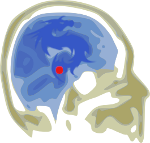
Whenever I've been forced to inhabit a cubicle, I've made sure Theodore Roethke's 'Dolor' hung on the wall. I first read Roethke in my American literature class as a freshman in high school (thank you Mr. Wofford and shortened here):
“I have known the inexorable sadness of pencils,
Neat in their boxes, dolor of pad and paper weight,
All the misery of manilla folders and mucilage,
Desolation in immaculate public places...
...And I have seen dust from the walls of institutions,
Finer than flour, alive, more dangerous than silica,
Sift, almost invisible, through long afternoons of tedium,
Dropping a fine film on nails and delicate eyebrows,
Glazing the pale hair, the duplicate grey standard faces.”
I had not yet experienced the full spectrum of this brand of pain the first time we read it in class: I had not yet entered the workforce. Although I had certainly felt, by that time, the sting of this type of pedagogy, I was still under the impression somehow that as an adult I would have the ability to transcend. It's one thing to move around from class to class at the sound of a buzzer as a child, and quite another for that expectation to not cease, in whatever symbolic form, once one grows up.
It pains me that, for example, as a human being I would feel the need to assert that I am more than just the money-seeking algorithm I have been calculated to be. Collectively, we are not simple economic animals, acting out the preferences and whims of the 'free' market. We are more than our earning potential. We are so much more than just consumers.
At this time, even the most 'radical' western global grumblings tells us we are in the midst of a 'class war' because of the growing gap in wealth, but they are just borrowing an agenda placed in front of them as an extension of the dominant form of thinking laid out by the powers that were. At some point, we must recognize that we are not involved in a global 'class war' in order to close the chasm of the wealth gap, but instead engaging in a war for our humanity because we have forgotten that we made money up, and we do not need money in order to live profitably.
Day after day we spend playing the role of someone who wakes up and goes to a job - despite the conditions, and how you might be interacted with, and what day off or vacation or sick day was denied on grounds that don't take your humanity into account - and all for the sake of making a dollar.
It's exhausting to come home and remember that you are human and try to understand what that means in the face of the day you just had, but it is essential that you do it anyhow.
It's compelling to drift into whatever smart commentary channel 9 has picked out for you this evening, but it is essential for the survival of your spirit that you turn away.
This is a call out into the void of imagination, into the deepest part of our collective will that we've lost the coordinates to, into the magic of remembering our ancestral birthrights, into the Akashic record that never forgets a word. We must take back the right we have to form our own agenda.
We must liberate ourselves from the collusion of food and money and progress.
We must remember ourselves outside of the 1,000-headed visions of high-resolution perfection our computers or the television says we should be. We must understand the value of our lives to be, at least in part, dependent on the level of consciousness we fill them with; and we must try as hard as we can to stay alert: awake. We are all currently on post watching through fog and darkness for ourselves and each other, awaiting our own arrivals momentarily. We must call into being and conjure - if not with our imaginations, then with our hearts - even beyond our own ability to recognize ourselves.
What we are learning right now is how to exert our birthright of collective Will. We each have inside us an internal sense of will, like an ity-bitty compass that we use to direct our own paths forward. We are not being called to arrive at some far-off notion of the future that we can't imagine how to bring forth as a whole, we just have to take the reigns of the next decision we make, and inform that decision with the values inherent in our hope for the best possible world.
Sometimes that will feel easy, and sometimes it will hurt so much you won't know how you're going to make it through.
But you'll surprise yourself and do it anyhow.
Soon the force of all of these little decisions we make, and have made, and continue to make, for the greater good and together, will gather momentum. Slowly at first, increasing logarithmically.
We are at the crest of a kind of movement we have only begun to imagine. Imagine what happens when we learn to drive...
